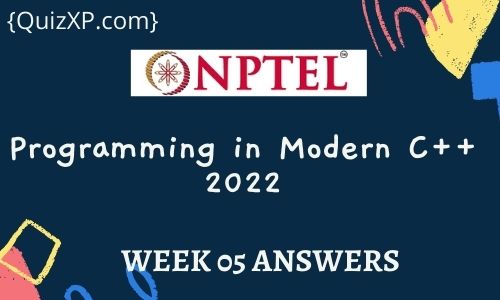Are you looking for the Answers to NPTEL Programming in Modern C++ Assignment 5? This article will help you with the answer to the National Programme on Technology Enhanced Learning (NPTEL) Course ” Programming in Modern C++ Assignment 5 “
What is Programming in Modern C++?
There has been a continual debate on which programming language/s to learn, to use. As the latest TIOBE Programming Community Index for August 2021 indicates – C (13%), Python (12%), C++ (7%), Java (10%), and C#(5%) together control nearly half the programming activities worldwide. Further, C Programming Language Family (C, C++, C#, Objective C etc.) dominate more than 25% of activities. Hence, learning C++ is important as one learns about the entire family, about Object-Oriented Programming and gets a solid foundation to also migrate to Java and Python as needed. C++ is the mother of most general purpose of languages. It is multi-paradigm encompassing procedural, object-oriented, generic, and even functional programming. C++ has primarily been the systems language till C++03 which punches efficiency of the code with the efficacy of OOP.
CRITERIA TO GET A CERTIFICATE
Average assignment score = 25% of the average of best 8 assignments out of the total 12 assignments given in the course.
Exam score = 75% of the proctored certification exam score out of 100
Final score = Average assignment score + Exam score
YOU WILL BE ELIGIBLE FOR A CERTIFICATE ONLY IF THE AVERAGE ASSIGNMENT SCORE >=10/25 AND EXAM SCORE >= 30/75. If one of the 2 criteria is not met, you will not get the certificate even if the Final score >= 40/100.
Below you can find the answers for NPTEL Programming in Modern C++ Assignment 5
NPTEL Programming in Modern C++ Assignment 5 Answers:-
Q1. Consider the following program. Fill in the blanks as per the instructions given below:
• at LINE-1 with appropriate initialization list to initialize the data members,• at LINE-2 to call printContact(),
Code:-
: roll_no(roll_no_),name(name_),Contact(phone_no_,address_){} //LINE-1
void printContact(){
Contact::printContact();
} //LINQ2. Consider the following program. Fill in the blanks as per the instructions given below:
• at LINE-1 and LINE-3 with appropriate inheritance statement,• at LINE-2 and LINE-4 with appropriate initialization lists,
Code:-
class Car : public Vehicle{ //LINE-1
protected:
int no_of_passengers;
public:
Car(int nw, int np) : Vehicle(nw),no_of_passengers(np) {} //LINE-2
friend ostream& operator<<(ostream& os, const Car& d);
};
class Truck : public Vehicle{ //LINE-3
protected:
int load_capacity;
public:
Truck(int nw, int lc) : Vehicle(nw),load_capacity(lc) {} //LINE???? Next Week Answers: Assignment 06 ????
Q3. Consider the following program. Fill in the blanks as per the instructions given below:
• at LINE-1, LINE-2 and LINE-3 with initialization list,• at LINE-4, LINE-5 and LINE-6 with function definitions,
Code:-
A::A(int _a) : a{_a}{} //LINE-1
B::B(int _a, int _b) : A{_a} {b=_b;} //LINE-2
C::C(int _a, int _b, int _c) : B{_a,_b} {c=_c;} //LINE-3
int A::sum(){ return a; } //LINE-4
int B::sum(){ return (A::sum()+b); } //LINE-5
int C::sum(){ return (B::sum()+c); } //LINE-6For other courses answers:- Visit
For Internship and job updates:- Visit


